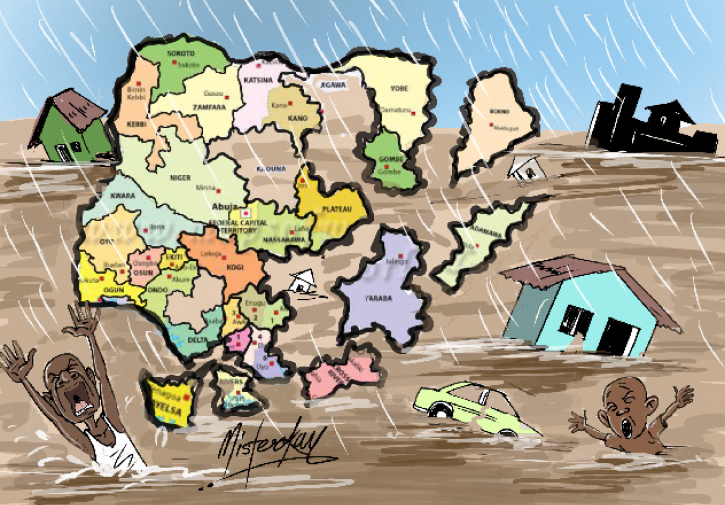Clearly, the recent flooding that swept across some states of the federation, leading to loss of lives and destruction of property, is nothing but a double whammy for all Nigerians. As citizens, we are all affected. Nigerians are passing through one of the worst times in the nation’s history, where the cost of living is at its highest peak ever. And the recent flood disaster is compounding their woes.
As of the last count, no fewer than 30 states have witnessed different degrees of flood disaster, with many lives lost and possessions worth hundreds of millions in naira destroyed. More than 200 people, including children, have been confirmed killed, with over 300,000 reportedly displaced.
Flooding has become a recurring phenomenon in Nigeria due to the increasing impact of climate change and many other human-induced factors. But the recent incident in Maiduguri is a disaster of unimaginable proportions.
Maiduguri’s tragedy
The federal government issued warnings about potential flooding in 31 states, including Borno, earlier this year based on its annual flood outlook. However, no one anticipated the severity of the disaster that struck Maiduguri on Tuesday. The government had warned that 148 local government areas in these states are at the risk of severe flooding from April to November 2024.
This week, the overflow of Alau Dam caused severe flooding in Maiduguri, submerging large parts of the city. Homes, streets, and other properties were inundated, leading to a temporary halt in daily life as residents fled to safety. The aftermath left many families displaced and mourning the destruction of their belongings.
Maiduguri’s situation is particularly disheartening, as the city is still recovering from years of insurgency.
Many residents, previously displaced by violence, now find themselves in even more desperate conditions.
Palpably, the Tuesday flood disaster, where a sizeable part of Maiduguri was submerged with homes, streets, and other property flooded, is a national tragedy of unimaginable proportions. Of course, life in this ancient city was temporarily put to a halt as residents scampered for safety. The flood left in its trail weeping, wailing and gnashing of teeth as residents continue to count their losses. The scariest part of this tragedy is that there is no end in sight. It appears we are helpless without any concrete measures to mitigate this disaster. The story of the Maiduguri flood is numbing. But as it is often said, it is what it is. At this time, residents of Maiduguri and, indeed, other areas affected by this devastating flood disaster need our prayers and all the support available.
Double whammy
These floods have arrived at a time when Nigerians are already grappling with severe challenges. Over 63% of the population, approximately 133 million people, are considered multidimensionally poor, and government policies have further worsened living conditions.
The government’s anti-people policies—fuel price hike arising from the removal of fuel subsidy and its attendant consequences on steep increase in prices of foodstuff and other essential commodities, floating of the naira, badly managed foreign exchange regime, and intractable insecurity, which has made it impossible for farmers to cultivate their farms seamlessly, among others—have worsened the already deplorable situation of Nigerians, and the flood disaster is coming like the proverbial last straw that broke the camel’s back.
For residents of communities affected by flood disasters across 30 states of the federation, who, like most Nigerians, are already living in a very precarious situation, the flood disaster is a double whammy. Many in this perilous situation will be right to declare that this is not the best time to live as a Nigerian. But this, too, shall pass away.
Poor preventive measures
But while we resign to fate and pray for these dangerous times and circumstances to pass away, as we always do, it is pertinent to ask what measures the national and subnational governments took to avert the flooding.
As for the Maiduguri incident, perhaps the government needs to tell Nigerians the measures it took when it noticed that the Alau dam was full to capacity and may overflow. The dam had collapsed before in 1994, displacing 400,000 families. Given that history, proactive steps should have been taken as the dam filled up. Unfortunately, it seems those steps were not taken. Why is it that the country continues to experience severe flooding despite repeated warnings?
It is crystal clear that no concrete measures were put in place by federal and state governments beyond the lame warning of an impending flood from the federal government. It is sad that this has been a recurring decimal. We cannot do the same thing over and over again yet expect to get different results. It doesn’t happen that way and will not.
In the days ahead, we will be treated to the same approach the nation has adopted for years. Relief materials will be given to the victims, but this will barely meet the needs of the victims, and corruption may prevent them from reaching the intended beneficiaries. We will then wait for another rainy season and, possibly, flood incidence.
Governments at all levels must develop and implement long-term solutions to address flood disasters, including relocating residents from flood-prone areas. In the short term, it is essential that both the government and citizens come together to provide relief for the victims of this disaster.
While disasters can never occur at a good time, the current flood crisis, amid the economic downturn, soaring inflation, and widespread insecurity, feels particularly devastating. Ultimately, these floods are heightening the existential threats Nigerians face.





